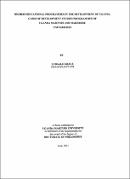| dc.description.abstract | The study is on the Higher Educational programmes in the development of Uganda. This is because in recent years, Higher Education (HE) has received considerable attention from major development agents like the World Bank, governments, public and private sector agents plus families having been widerrated for some time yet vital in the area of training human resource and research. In Uganda, enrolment in HE has increased more than 1000 % in the last three decades with more than 200 programmes in the 28 universities by 2008. The study specifically focuses on the Development Studies (OS) programmes of UMU and MUK whose graduates are meant to propel development in Uganda yet gaps in the development process are still evident. Tben:fore, the study aimed at examining the curriculum, pedagogy, assessment, contributions, challenges and opportunities of OS programmes in the development of Uganda.
Both qualitative and quantitative approaches were employed so as to provide the necessary triangulation for getting a more composite data to articulate better the findings. Further, a descriptive research design specifically a case study was adopted in order to secure in-depth data regarding OSprogrammes and graduates. The study used a sample size of 24S respondents using research instruments of a semi-stJUCtured questionnaire, interview guide, discussion guide, and check list.
The study found out that graduates are making contributions to the development of Uganda panly because of HE. However, there are still gaps in the development process which graduates have not been able to close because of the limitations in the curriculum, pedagogy and assessment techniques,and the existence of internal and external challenges affecting them.
The study identified the following opportunities for OS programmes as; a new area of study, able to attract sponsorship, wide range of employment opportunities, and increased number of applicants. The study made the following recommendations ; improve on the inputs process-outputs of education, scholastic materials, establish a development Think Tank, tighten admission criteria, academic staff, and tutor-students mentoring. The study concludes by recommending for curriculum review which will reflect the cognitive, affective and psychomotor domains in order to produce more competent graduates for the development of Uganda. | en_US |

